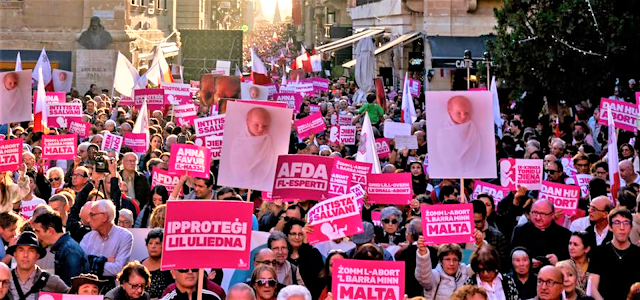Abortion, International Politics
Malta’s pro-life movement battles to keep their nation abortion-free
By Jonathon Van Maren
On December 4, 2022, the streets of Valetta, Malta, were packed with people hoisting pink signs and large photographs of babies in the womb. The crowd—20,000 strong—headed to Castille Square, the largest in the capital, and placed an enormous photo of a newborn baby on the steps leading to Prime Minister Robert Abela’s office as chants of “Long live life! No to abortion!” rang from the walls. From the square the crowd marched to Republic Street, where former President Marie-Louise Coleiro Preca, former EU Commissioner Tonio Borg, Irish MP Carol Nolan, retired judge Giovanni Bonello, Life Network CEO Dr. Miriam Sciberras, and other guests delivered speeches.
The protest consisted of a full 4% of the Maltese population and was one of the largest in the nation’s recent history. The attendees were of all ages and religious beliefs and hailed from across the political spectrum, from the leader of the conservative opposition to a center-Left former president. Their slogans highlighted what united them: “Keep abortion out of Malta”; “No to abortion, yes to life”; “Protect our children.” The marchers were protesting the government’s decision to put forward a bill to introduce abortion. Prior to the protest, a petition had been signed by 26,000 people calling on the government to reject the proposed legislation.
As pro-life regimes such as the Republic of Ireland and Northern Ireland have fallen over the past several years, abortion activists have fixed their attention on Malta, the smallest country in the European Union. Malta is a central Mediterranean archipelago between Sicily and the coast of North Africa with a population of 500,000. Although church attendance has been declining steadily in recent years, Malta is still officially Roman Catholic—and the last country in the EU where abortion is illegal (the criminal code prohibition dates to 1724). According to reports, around 300 Maltese women seek abortions outside the country each year. If the current Labour government has their way, that may change.
I recently spoke with Dr. Miriam Sciberras, one of Malta’s pro-life leaders, about the battle underway for the lives of the pre-born. It has been months since the international mainstream media predicted that abortion legislation would pass in Malta, but thus far pro-life efforts have been successful—although the battle is far from over. It began in 2021, when American tourist Andrea Predente requested and was refused an abortion after suffering ruptured membranes during pregnancy. She was airlifted to Spain where she procured a termination via early delivery. Following this, the government announced a review of the abortion ban. Health Minister Chris Fearne insisted that the case highlighted the need for a more permissive abortion regime.
It is important to note that Malta’s pro-life regime has resulted in zero maternal mortalities in the past decade, and Malta has one of the best maternal health records in the world. “In Malta, doctors are protected, and have been protected for generations, to do what is necessary if the mother’s life is in danger, even if that means that the inevitable consequence would be the death of the child,” Sciberras told me. Indeed, women have always had access to life-saving treatment—but pro-abortion propaganda from the Americas to Europe insists that women will die if children in the womb are protected. In the Prudente case, Sciberras noted, it has since been established in court of law that her life was not in danger. Nevertheless, this case—like the case of Savita Halappanavar in Ireland—is being cited as evidence for the necessity of an abortion amendment in Malta’s criminal code. Sciberras says that the pro-life movement supports affirming the right of medical professionals to give life-saving care, but not legalizing abortion because “it is the killing of a human being.”
READ THE REST OF THIS COLUMN AT THE EUROPEAN CONSERVATIVE








